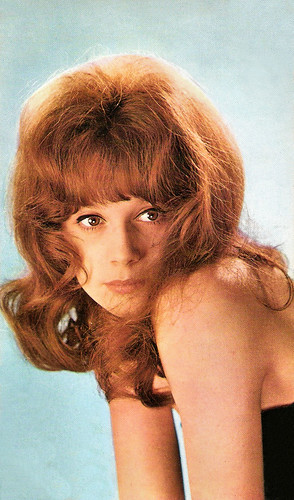
French postcard by E.D.U.G., offered by Corvisart, Epinal, no. 319. Photo: Sam Lévin.
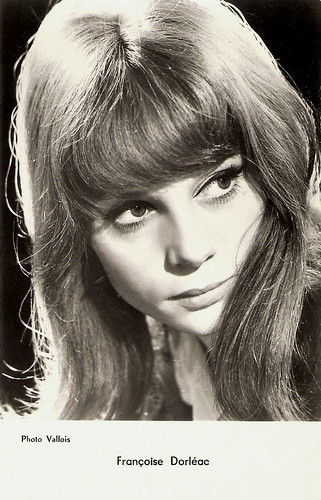
French postcard by Editions P.I., no. 1142. Photo: Vallois.
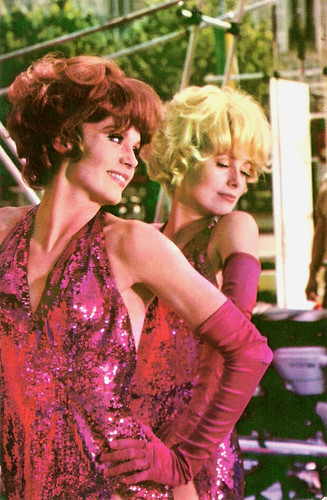
Romanian postcard by Casa Filmului Acin, no. 120. Photo: publicity still for Les Demoiselles de Rochefort/The Young Girls of Rochefort (Jacques Demy, 1967) with Catherine Deneuve.
Slim, brunette stunner
Françoise Dorléac was born in Paris in 1942. She was the daughter of screen actor Maurice Dorléac and Renée Deneuve, and the sister of Danielle Dorléac, Catherine Deneuve and Sylvie Dorléac. Françoise first appeared on stage at the age of 10. She entered the film industry with the short film Mensonges (1957) and made her stage debut in Gigi by Colette at the Théâtre Antoine, Paris, in 1960. Meanwhile, she studied at the Conservatoire d'Art Dramatique (1957-1961).
The slim, brunette stunner modelled for Christian Dior, and also graced several films including Arsène Lupin contre Arsène Lupin/Arsène Lupin Contra Arsène Lupin (Edouard Molinaro, 1962) opposite Jean-Pierre Cassel, with whom she was engaged for a while.
In 1964 she hit stardom with her roles in François Truffaut's melodrama La peau douce/The Soft Skin (1964) and the James Bond-like spy spoof L'homme de Rio/That Man from Rio (Philippe de Broca, 1964), in which she showed a razor-sharp comic timing. At IMDb, reviewer Gary Brumburgh writes: “The two films showed the polar sides of Francoise's incredible allure and talent. In the former, she played an airline stewardess who falls into a tragic affair with a married businessman (Jean Desailly) and in the latter, she played a fun and flaky heroine opposite Jean-Paul Belmondo.”
She branched out in international productions such as Genghis Khan (Henry Levin, 1965) featuring Omar Sharif, and Where the Spies Are (Val Guest, 1965) with David Niven.
Another highlight was her part as the adulterous wife of Donald Pleasence in the black comedy Cul-de-sac (Roman Polanski, 1966). Hal Erickson of AllMovie reviews: "Drawing upon two of Polanski's favourite themes-isolation and latent insanity - Cul de Sac actually improves upon each viewing, assuming that the viewer has the intestinal fortitude to sit through it once."
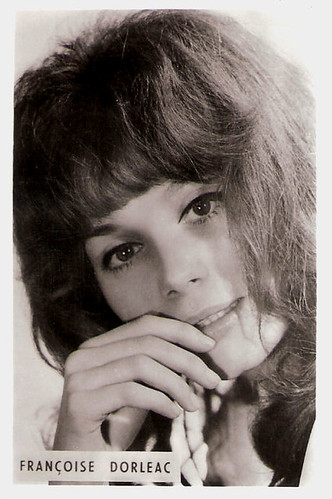
Small collectors card.
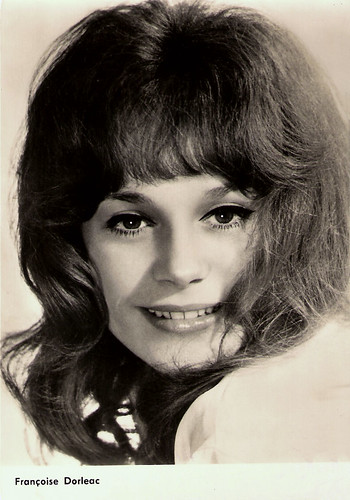
East-German postcard by VEB Progress Film-Vertrieb, Berlin.
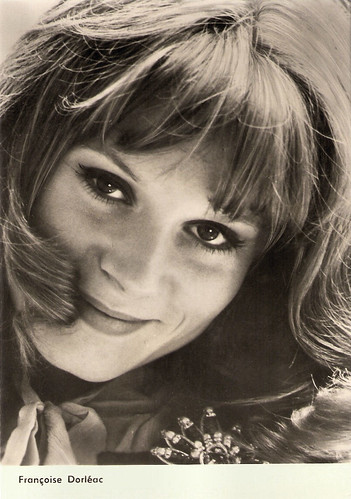
East-German postcard by VEB Progress Film-Vertrieb, Berlin, no. 2528, 1965. Retail price: 0,20 MDN.
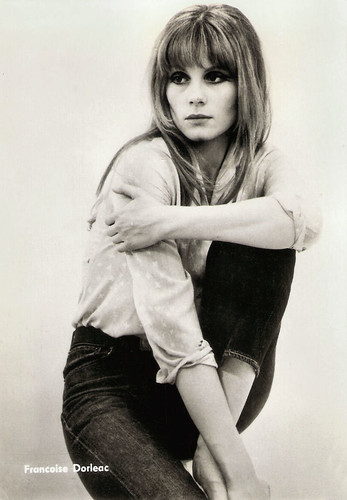
East-German postcard by VEB Progress Film-Vertrieb, Berlin, no. 3292, 1968.
Unbridled sense of joie-de-vivre
While her sister Catherine was cool, calm, remote, and possessed with an edge of mystery about her, Françoise Dorléac proved a fun, carefree, outgoing presence both on and off camera. Known for her chic, stylish ways and almost unbridled sense of 'joie-de-vivre', she continued making strong marks.
Françoise and Catherine starred together in the musical Les Demoiselles de Rochefort/The Young Girls of Rochefort (Jacques Demy, 1967) opposite Gene Kelly and George Chakiris. This colourful follow-up to Demy’s earlier success Les Parapluies de Cherbourg/The Umbrellas of Cherbourg (Jacques Demy, 1964) paid homage to the Hollywood musicals of the 1940s. Françoise and Catherine, who looked quite similar, played singing twins who dream about living in Paris.
The next film of the luminous Dorléac was the spy film Billion Dollar Brain (Ken Russell, 1967) starring Michael Caine as Harry Palmer.
Then her thriving career came to an abrupt and tragic halt when she suddenly died in a car accident. She had lost control of her sports car. The rented Renault crashed and burned on a roadway in Nice, France. She had been en route to Nice airport and feared missing her flight. She had intended to fly to London to complete her work on Billion Dollar Brain, and to attend the British premiere of Les Demoiselles de Rochefort.
Dorléac was seen struggling to get out of the burning car but was unable to open the door. According to Wikipedia the police later identified her body only from the fragment of a checkbook, a diary and her driver's license. Gary Brumburgh writes: “Her early death at age 25 most certainly robbed the cinema of a tried and true talent and incomparably beautiful mademoiselle who showed every sign of taking Hollywood by storm, as Catherine later did.”
Françoise Dorléac and Donald Pleasance in Cul-de-Sac (Roman Polanski, 1965). Source: Klautenbogg (YouTube).
Hilarious sixties video clip: Françoise Dorléac sings 'Mario j'ai mal'. Source: petiteteigne (YouTube).
Sources: Gary Brumburgh (IMDb), Hal Erickson (AllMovie), Wikipedia and IMDb.
This post was last updated on 23 January 2024.
Oh, to be a young person in Paris in the 60s. Wonderful post Bob. Thank you.
ReplyDeleteI remember some of her films. It's so sad that her life came to such an abrupt end. What an appalling way to die!
ReplyDelete